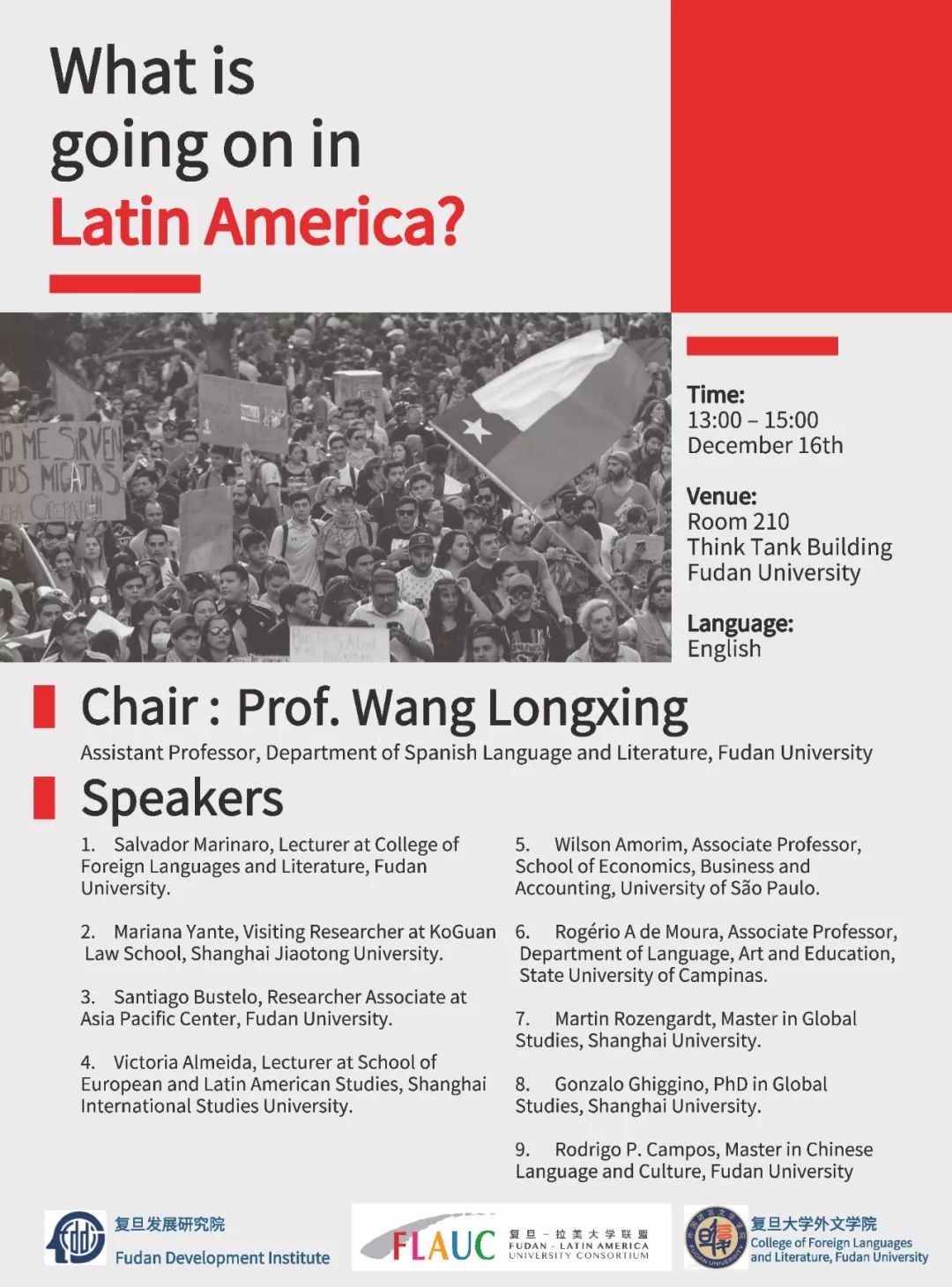Author: Release date:2019-12-16 13:00:00Source:发展研究院英文

Time
13:00-15:00, December 16th
Venue
Room 210, Think Tank Building, Fudan University.
Chair
Prof. Wang Longxing, Assistant Professor, Department of Spanish Language and Literature, Fudan University
Speakers
1. Salvador Marinaro, Lecturer at College of Foreign Languages and Literature, Fudan University.
2. Mariana Yante, Visiting Researcher at KoGuan Law School, Shanghai Jiaotong University.
3. Santiago Bustelo, Researcher Associate at Asia Pacific Center, Fudan University.
4. Victoria Almeida, Lecturer at School of European and Latin American Studies, Shanghai International Studies University.
5. Wilson Amorim, Associate Professor, School of Economics, Business and Accounting, University of São Paulo.
6. Rogério A de Moura, Associate Professor, Department of Language, Art and Education, State University of Campinas.
7. Martin Rozengardt, Master in Global Studies, Shanghai University.
8. Gonzalo Ghiggino, PhD in Global Studies, Shanghai University.
9. Rodrigo P. Campos, Master in Chinese Language and Culture, Fudan University
Organizers
Fudan Development Institute & Department of Spanish Language and Literature, Fudan University
Language
English
Background
After a decade of sustained growth, improved social indicators and poverty reduction during the beginnings of the 21st Century, in more recent years Latin America entered in a new phase of low economic growth and political instability. Social discontent and massive mobilizations have risen in almost every country in the region, reaching such a point that some analysts have defined them as the biggest social mobilization in the last twenty years.
Current events have deep structural economic and social roots, as most Latin American countries have experienced financial headwinds followed by political transitions. The center-leftist coalitions that had ruled the continent since the 2000s witnessed political crisis in the last years, like the Worker´s Party in Brazil and Evo Morales in Bolivia. Argentina, despite an organized political transition in 2015, entered into a severe economic crisis which led to worsening social indicators and resulted in the election of a new government.
However, economic factors by themselves cannot explain the present social unstability and commotion. To mention one example, Chile who has undergone continuous economic per capita income growth, is experiencing one of the most spectacular social mobilization since the 1990s. The response of the government was to call for a Constitutional reform. However, the crisis is still far from being solved and social manifestations are still going on.
There is no single answer to the question about what is going on in the continent. Nevertheless, it is possible to trace some common characteristics among these recent events and across countries. Understanding the current trends and the meaning of these different social manifestations is fundamental in order to visualize the present and future of the Latin American continent. This roundtable discussion is looking to stimulate the debate, and foster the dialogue among the speakers, scholars and the audience looking to improve the knowledge and critical perception on the present conditions in the region.
Methodology
The event is mainly based on a roundtable discussion. Each speaker will have 5 to 7 minutes to present their hypothesis and interpretations. Then, the second part will consist in 45-minutes discussion and Q & A.
Target audience
Researchers, scholars and postgraduate students, in order to foster a collaborative dialogue on the present condition in Latin America.